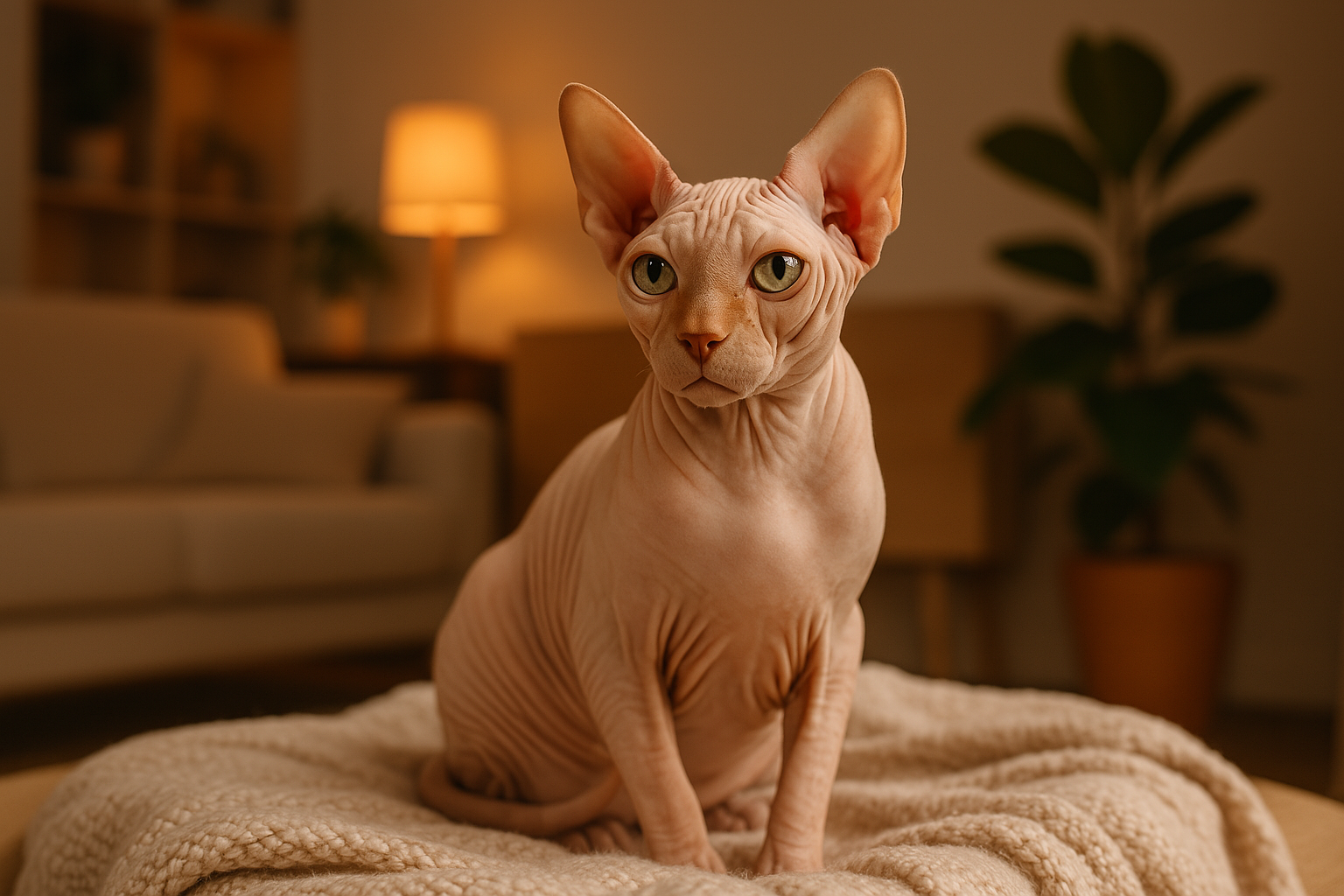Sphynx cats are among the most instantly recognizable breeds — known for their hairless bodies, large ears, and expressive eyes. But beyond their unusual appearance lies a cat that is affectionate, curious, and surprisingly high-maintenance. These cats form strong bonds with their humans and thrive on attention.
In this article, you’ll learn how to properly care for a Sphynx cat — from skin care to warmth, hygiene, and building a happy, healthy bond.
What Makes the Sphynx Unique?
Sphynx cats are:
- Hairless (but not hypoallergenic)
- Warm to the touch with suede-like skin
- Highly social and affectionate
- Extremely intelligent and playful
- Vocal and attention-seeking
They crave human companionship and are often described as dog-like in their loyalty. If you’re looking for a cat that wants to be involved in everything you do — the Sphynx might be your perfect match.
Hairless… but Not Low-Maintenance
Contrary to what many people believe, hairless does not mean easy to care for. Sphynx cats require more grooming than most cats — just in different ways.
Skin Care
- Bathe weekly or biweekly: Their skin builds up natural oils that aren’t absorbed by fur.
- Use a gentle, unscented cat shampoo.
- Dry thoroughly with a soft towel.
- Check folds and armpits for trapped dirt or oil.
- Avoid over-bathing, which can dry the skin.
Ear Cleaning
- Sphynx cats produce more earwax than other cats.
- Clean ears weekly with a vet-recommended cleaner.
- Avoid using cotton swabs deep inside the ear canal.
Nail and Paw Care
- Clean between toes where grime collects.
- Trim nails every 1–2 weeks.
Their skin is sensitive, so always use gentle products and soft materials.
Temperature Sensitivity
Sphynx cats have no fur to keep them warm or cool. You’ll need to protect them from:
- Cold: Provide sweaters, blankets, and heated beds.
- Sunburn: Keep them out of direct sunlight or use pet-safe sunscreen.
- Temperature changes: Keep indoor temperatures stable.
They love sleeping under covers and snuggling in warm spots — even on your laptop!
Feeding and Nutrition
Without fur, Sphynx cats expend more energy keeping themselves warm, so they need a high-calorie, protein-rich diet.
Feeding tips:
- Choose food with real meat as the first ingredient.
- Offer 2–3 meals per day or use a free-feeding schedule.
- Keep fresh water available at all times.
- Monitor weight to prevent obesity (despite high energy, they can overeat).
Some Sphynx cats may have food sensitivities — if you notice digestive issues, consult your vet.
Personality and Social Needs
Sphynx cats are extremely affectionate and attention-driven. They:
- Follow you everywhere
- Like to ride on shoulders or climb into laps
- Are vocal and expressive
- Dislike being left alone for long periods
- Often get along with children, dogs, and other cats
They do best in homes where someone is around most of the day — or with another pet for companionship.
Hygiene and Clean Living Space
Due to their oily skin and lack of fur, Sphynx cats can leave marks on furniture or bedding.
Tips:
- Use washable blankets or covers on furniture
- Clean their favorite spots regularly
- Keep litter boxes extra clean — they’re picky and have sensitive skin
- Wash their beds and clothes weekly
Good hygiene helps avoid skin irritation and unpleasant odors.
Play and Enrichment
These cats are intelligent, agile, and curious. Keep their minds and bodies active with:
- Climbing trees and perches
- Puzzle toys and feeders
- Wand toys and chase games
- Safe indoor adventures (cat tunnels, hide-and-seek)
- Trick training using positive reinforcement
Play with your Sphynx daily to strengthen your bond and support their health.
Health Considerations
Sphynx cats are generally healthy, but watch for:
- Hypertrophic Cardiomyopathy (HCM) – common in the breed
- Skin infections or fungal issues
- Respiratory issues in kittens
- Dental disease
- Sunburn or dry skin
Ensure:
- Regular vet visits
- Genetic testing if adopting from a breeder
- A good grooming and hygiene routine
- Indoor-only living to prevent injuries and exposure
Their average lifespan is 12–15 years, with some living even longer with proper care.
Final Thoughts: Is the Sphynx Cat Right for You?
Choose a Sphynx if you:
- Want a cuddly, affectionate cat that acts like a shadow
- Have time to bathe and groom weekly
- Prefer an interactive, intelligent companion
- Can keep your home warm and cozy
- Don’t mind talking to your cat — and being talked to!
The Sphynx may look unusual, but they’re all heart. If you can meet their unique needs, they will reward you with unwavering affection and an endless desire to be close to you — always.

